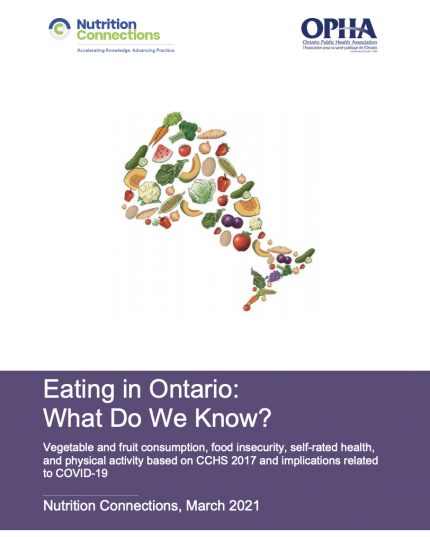OPHA and Nutrition Connections release new report on Food Insecurity
Posted: April 6, 2021
Categories: GoodFoodBites / News from Sustain Members
 Nutrition Connections and the Ontario Public Health Association released a new report, Eating in Ontario: What Do We Know, revealing the troubling depths of food insecurity among female lone-parent households, Indigenous populations, and low-income Ontarians.
Nutrition Connections and the Ontario Public Health Association released a new report, Eating in Ontario: What Do We Know, revealing the troubling depths of food insecurity among female lone-parent households, Indigenous populations, and low-income Ontarians.
“All Ontarians should be concerned by these disturbing findings,” said Pegeen Walsh, Executive Director of the Ontario Public Health Association. “Far too many of our neighbours – including children – lack access to the food they need to ensure good health and positive development. This has to end.”
The report is particularly concerned about the long-term implications of COVID-19 on households already affected by food insecurity or at risk, especially those with children.
A press release shares some of the most concerning findings (copied below):
- Nearly 1 in 7 (13.3%) of all households in Ontario experienced some level of food insecurity (marginal, moderate, or severe)
- Among all household living arrangement types in Ontario, food insecurity was highest in female lone parent households (33.6%) with children less than 18 years old.
- While perhaps, unsurprisingly, adults in the lowest income quintile in Ontario reported the highest prevalence of moderate or severe food insecurity, the gap is still striking. 1 in 4 poorer Ontarians (25.4%) are food insecure, compared to 0.6% of the wealthiest.
- Food insecurity (moderate and severe) is also three times higher among those who self-identified as Indigenous (22.5%) compared to the non-Indigenous population (6.8%) in Ontario.
- Inequity also insets itself into what we eat. The lowest income Ontarians were also the least likely to report consuming vegetables and fruit five or more times per day (23.0%) compared to the highest income Ontarians (28.4%). Insufficient consumption of fruit and vegetables is a risk factor for chronic disease.
“Addressing income and other social determinants of health is key to reducing food insecurity and preventing the development of chronic disease,” said Lynn Roblin, co-author of the report. “Without proper nutrition, people are at increased risk of heart disease, cancer, and diabetes.”
Read more on the Nutrition Connections website here.
This report is part of a series prepared to provide a better understanding of the determinants of healthy eating of Ontarians and to help inform policy and program development surrounding healthy eating and chronic disease prevention. It is a supplement to the Nutrition Resource Centre September 2017 report: Healthy Eating in Ontario: What do We Know? An Analysis of Eating Behaviours, Food Literacy and Food Insecurity Indicators.
